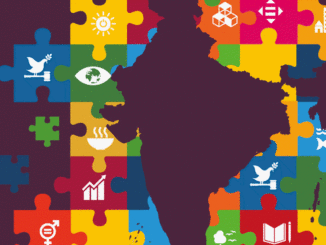
In July 2024, the Asian Development Bank (ADB) published an important report titled “Snapshot of Sustainable Development Goals at the Subnational Administration Level in Cambodia.” This comprehensive document provides an in-depth analysis of Cambodia’s subnational administrations (SNAs), highlighting their progress, challenges, and offering recommendations aimed at advancing the Sustainable Development Goals (SDGs) and promoting inclusive economic growth.
Amid growing recognition of the crucial role local governance plays in achieving global sustainability objectives, this report serves as an essential resource for policymakers, stakeholders, and citizens.
An Overview of Cambodia: The Context
Cambodia committed to achieving the Sustainable Development Goals (SDGs) by adopting the Cambodian Sustainable Development Goals (CSDGs) Framework in 2018, with 18 goals, 88 targets, and 148 indicators. The country conducted Voluntary National Reviews (VNRs) in 2019 and 2023 to assess progress, including revisions in 2022 to reflect COVID-19 impacts and data constraints. Despite subnational administrations (SNAs) playing a crucial role, their contributions are underrepresented in CSDG and VNR documents. Decentralization began in 2002 but has seen slow progress, particularly in functional and budgetary transfers. The 2021 Second National Program on Sub-national Democratic Development aims to accelerate reform.
Prepared within this context, the ADB report outlines steps to assess the localization of the SDGs at the subnational administration (SNA) level in Cambodia. It emphasizes understanding the challenges, successes, and dynamics of localization through diverse methodologies and stakeholder engagement. Strategic recommendations are provided to enhance the quality, pace, and relevance of SDG localization at the SNA level. The diagnostic report aims to help Cambodia, the Asian Development Bank (ADB), and other stakeholders address gaps and improve outcomes in localization efforts.
Methodology and Data Collection
The report utilizes ADB’s Conceptual Framework for the Country Snapshot of SDG Localization in Asia and the Pacific as its foundational document. The methodologies and data collection includes policy reviews of decentralization reforms, thorough literature reviews of existing research, and key informant interviews (KIIs) with both national-level stakeholders and local officials. Additionally, the assessment involved extensive fieldwork across four provinces, carefully selected to represent urban, semi-urban, and rural settings, ensuring a well-rounded and contextually grounded analysis.
Key Findings
Cambodia has made significant progress towards achieving its Cambodian Sustainable Development Goals (CSDGs), yet the role of subnational administrations (SNAs) is not adequately recognized. Challenges such as low awareness and insufficient data impede the effective mapping of SNA contributions. Although SNAs have significantly impacted areas like poverty reduction, health, and education, issues with data availability and coordination persist. Recommendations include boosting SDG awareness through digital channels, involving SNAs more directly in CSDG activities, and developing comprehensive datasets for better monitoring and evaluation.
Despite advancements in legal, policy, and institutional frameworks for SNAs, critical inconsistencies and coordination issues among laws and regulations remain. Gaps exist in functional assignments, partnerships with the private sector, and monitoring and evaluation. Although budgets for SNAs have increased, vertical and horizontal imbalances, along with limited own-source revenue, continue to hinder their effectiveness in contributing to national development and SDGs. Urgent attention is needed on addressing functional assignments, particularly at the district level, and improving alignment of SNA planning with national priorities. Furthermore, while SNAs have democratic accountability mechanisms, improvements are needed in data management and audit functions.
Recommendations for Progress
As Cambodia continues its journey towards sustainable development, the findings and recommendations outlined in this report serve as a crucial roadmap for policymakers, local administrations, and stakeholders. The success of Cambodia’s decentralization reform hinges on effective coordination, strategic collaboration, and the systematic linking of local functions with national goals.
Key recommendations:
- Strengthening the so-called ‘3+1 reform’ mechanism is imperative to ensuring that decentralization, Public Financial Management Reform Program (PFMRP), National Program for Administrative Reform (NPAR), and judicial reforms are synchronized and mutually reinforcing. This coordination will not only foster accountability across line ministries but also ensure that sectoral functional transfers are efficiently managed and implemented.
- Collaboration among central agencies (including the NCDD-S, MEF, MOI, MCS, and MOP) should also be intensified. These agencies hold the necessary influence to drive reforms forward and ensure that all stakeholders remain engaged and committed.
- Moreover, explicit and systematic linkages between Sub-National Administrations (SNAs) and the Cambodian Sustainable Development Goals (CSDGs) must be established. This approach will create a shared sense of responsibility and accountability, supported by concrete data and evidence.
- Prioritizing the functional transfer to District and Municipality/Khan (DMK) levels is essential for improving public service delivery. Adequate budget allocation and a clear distinction between obligatory and permissive functions will empower local administrations to meet the needs of their communities more effectively.
- The relationship between DMK administrations and line departments must also be strengthened. This includes revising sector regulations to align with decentralization reforms and ensuring consistency in data usage for planning and monitoring.
- Lastly, SNAs should systematize their engagement with the private sector by establishing clear coordination mechanisms and updating data on private sector involvement in local service delivery and development. These steps will foster more effective collaboration and contribute to the overall success of the decentralization reform.
Conclusion
Achieving the United Nations Sustainable Development Goals (SDGs) in Cambodia requires a localized approach, with Subnational Administrations (SNAs) playing a pivotal role, as two-thirds of SDG targets are locally oriented. By implementing these strategic recommendations and fostering collaboration among government bodies, civil society, and the private sector, Cambodia can build a more sustainable, equitable, and resilient future for all its citizens. With commitment and a shared vision, the country can transform its governance landscape, ensuring that the benefits of development reach every corner of the nation.
Access full report here: Asian Development Bank. 2024. Snapshot of Sustainable Development Goals at the Subnational Administration Level in Cambodia. Manila: ADB.





